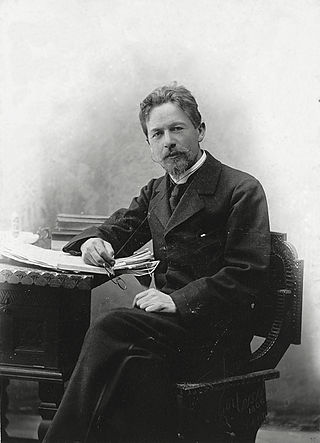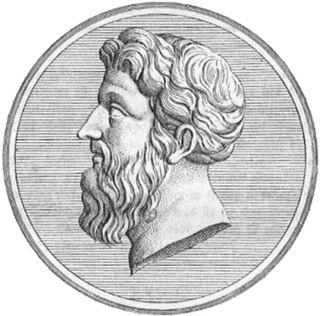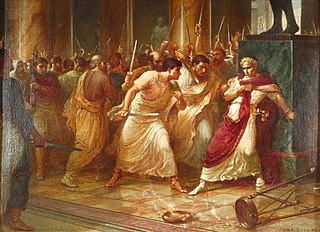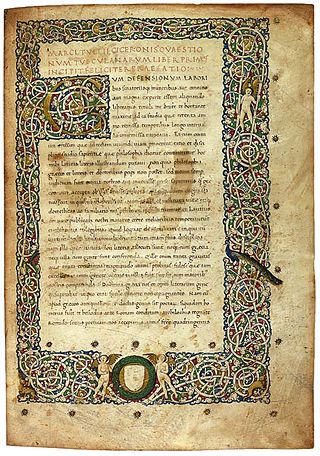Related Research Articles

Anton Pavlovich Chekhov was a Russian playwright and physician who is considered to be one of the greatest writers of all time. His career as a playwright produced four classics, and his best short stories are held in high esteem by writers and critics. Along with Henrik Ibsen and August Strindberg, Chekhov is often referred to as one of the three seminal figures in the birth of early modernism in the theatre. Chekhov was a physician by profession. "Medicine is my lawful wife", he once said, "and literature is my mistress."

In publishing and graphic design, Lorem ipsum is a placeholder text commonly used to demonstrate the visual form of a document or a typeface without relying on meaningful content. Lorem ipsum may be used as a placeholder before the final copy is available. It is also used to temporarily replace text in a process called greeking, which allows designers to consider the form of a webpage or publication, without the meaning of the text influencing the design.
In the social sciences, methodological individualism is a framework that describes social phenomena as a consequence of subjective personal motivations by individual actors. Class or group dynamics, which operate on systemic explanations, are deemed illusory, and, thus, rejected or de-prioritized. With its bottom-up micro-level approach, methodological individualism is often contrasted with methodological holism, a top-down macro-level approach, and methodological pluralism.

The Seagull is a play by Russian dramatist Anton Chekhov, written in 1895 and first produced in 1896. The Seagull is generally considered to be the first of his four major plays. It dramatizes the romantic and artistic conflicts between four characters: the famous middlebrow story writer Boris Trigorin, the ingenue Nina, the fading actress Irina Arkadina, and her son the symbolist playwright Konstantin Treplev.
Credo quia absurdum is a Latin phrase that means "I believe because it is absurd", originally misattributed to Tertullian in his De Carne Christi. It is believed to be a paraphrasing of Tertullian's "prorsus credibile est, quia ineptum est" which means "it is completely credible because it is unsuitable", or "certum est, quia impossibile" which means "it is certain because it is impossible". These are consistent with the anti-Marcionite context. Early modern, Protestant and Enlightenment rhetoric against Catholicism and religion more broadly resulted in this phrase being changed to "I believe because it is absurd", displaced from its original anti-Marcionite to a personally religious context.
Nihil novi nisi commune consensu is the original Latin title of a 1505 act or constitution adopted by the Polish Sejm (parliament), meeting in the royal castle at Radom.

The Peripatetic axiom is: "Nothing is in the intellect that was not first in the senses". It is found in Thomas Aquinas's De veritate, q. 2 a. 3 arg. 19.

The Latin phrase Demortuisnilnisibonumdicendumest, "Of the dead nothing but good is to be said." — abbreviated Nil nisi bonum — is a mortuary aphorism indicating that it is socially inappropriate for the living to speak ill of the dead who cannot defend or justify themselves.
In Latin grammar, a gerundive is a verb form that functions as a verbal adjective.

Et tu, Brute? is a Latin phrase literally meaning "and you, Brutus?" or "also you, Brutus?", often translated as "You as well, Brutus?", "You too, Brutus?", or "Even you, Brutus?". The quote appears in Act 3 Scene 1 of William Shakespeare's play Julius Caesar, where it is spoken by the Roman dictator Julius Caesar, at the moment of his assassination, to his friend Marcus Junius Brutus, upon recognizing him as one of the assassins. The first known occurrences of the phrase are said to be in two earlier Elizabethan plays; Henry VI, Part 3 by Shakespeare, and an even earlier play, Caesar Interfectus, by Richard Edes. The phrase is often used apart from the plays to signify an unexpected betrayal by a friend.

The Tusculanae Disputationes is a series of five books written by Cicero, around 45 BC, attempting to popularise Greek philosophy in Ancient Rome, including Stoicism. It is so called as it was reportedly written at his villa in Tusculum. His daughter had recently died and in mourning Cicero devoted himself to philosophical studies. The Tusculan Disputations consist of five books, each on a particular theme: On the contempt of death; On pain; On grief; On emotional disturbances; and whether Virtue alone is sufficient for a happy life.
Latin obscenity is the profane, indecent, or impolite vocabulary of Latin, and its uses. Words deemed obscene were described as obsc(a)ena, or improba. Documented obscenities occurred rarely in classical Latin literature, limited to certain types of writing such as epigrams, but they are commonly used in the graffiti written on the walls of Pompeii and Herculaneum. Among the documents of interest in this area is a letter written by Cicero in 45 BC to a friend called Paetus, in which he alludes to a number of obscene words without actually naming them.
Ubi panis ibi patria is a Latin expression meaning "Where there is bread, there is (my) country". According to J. Hector St. John de Crèvecœur in "What is an American", the third of his Letters from an American Farmer, this is the motto of all European immigrants to the United States. It is not clear whether the phrase originates in Crèvecœur's writings or somebody else's.
Contra principia negantem non est disputandum is a principle of logic and law: in order to debate reasonably about a disagreement, there must be agreement about the principles or facts by which to judge the arguments.

Nihil admirari is a Latin phrase. It means "to be surprised by nothing", or in the imperative, "Let nothing astonish you".
Geoffrey Streatfeild is an English actor in film, television, stage and radio.

The White Dacha is the house that Anton Chekhov had built in Yalta and in which he wrote some of his greatest work. It is now a writer's house museum.
"A Misfortune", sometimes translated "Misfortune", is an 1886 story by Anton Chekhov. First published in Novoye Vremya, the story concerns Sofya Petrovna, the young wife of a country notary, whose attempts to turn away a suitor only expose her own desire for him and drive her toward an affair. The main theme is sexual enthrallment, a frequent concern in Chekhov's work during this period.

Augustinianism is the philosophical and theological system of Augustine of Hippo and its subsequent development by other thinkers, notably Boethius, Anselm of Canterbury and Bonaventure. Among Augustine's most important works are The City of God, De doctrina Christiana, and Confessions.

The Proverbia Grecorum is an anonymous Latin collection of proverbs compiled in the seventh or eighth century AD in the British Isles, probably in Ireland. Despite the name, it has no known Greek source. It was perhaps designed as a secular complement to the Hebrew Bible's Book of Proverbs.
References
- ↑ "De gustibus non est disputandum". The New Dictionary of Cultural Literacy, Third Edition. 2002
- ↑ "de gustibus non est disputandum". Merriam-Webster Online Dictionary .
- ↑ Bartlett, John (1992). Familiar Quotations (16 ed.). Boston: Little, Brown. p. 118. ISBN 0-316-08277-5.
- ↑ Chekhov, Anton (1997). "Introduction". The Seagull. trans. by Stephen Mulrine. London: Nick Hern Books Ltd. pp. xvii. ISBN 1-85459-193-2.